New 2021 Azure AI-100 SPRI exam questions from leads4pass AI-100 dumps!
Welcome to download the newest leads4pass AI-100 VCE and PDF dumps: https://www.leads4pass.com/ai-100.html (181 Q&As)
P.S. Free 2021 Azure AI-100 Dumps are available on Google Drive shared by leads4pass: https://drive.google.com/file/d/1fT67LjZymijCvGqGlML0X7jRhJ7u3osb/
Free Azure AI-100 exam questions and answers
QUESTION 1
You have Azure IoT Edge devices that generate measurement data from temperature sensors. The data changes very
slowly.
You need to analyze the data in a temporal two-minute window. If the temperature rises five degrees above a limit, an
alert must be raised. The solution must minimize the development of custom code.
What should you use?
A. A Machine Learning model as a web service
B. an Azure Machine Learning model as an IoT Edge module
C. Azure Stream Analytics as an IoT Edge module
D. Azure Functions as an IoT Edge module
Correct Answer: C
References: https://docs.microsoft.com/en-us/azure/iot-edge/tutorial-deploy-stream-analytics
QUESTION 2
DRAG DROP
You need to create a bot to meet the following requirements:
1.
The bot must support multiple bot channels including Direct Line.
2.
Users must be able to sign in to the bot by using a Gmail user account and save activities and preferences.
Which four actions should you perform in sequence? To answer, move the appropriate actions from the list of actions to the answer area and arrange them in the correct order.
NOTE: More than one order of answer choices is correct. You will receive credit for any of the correct orders you select.
Select and Place:
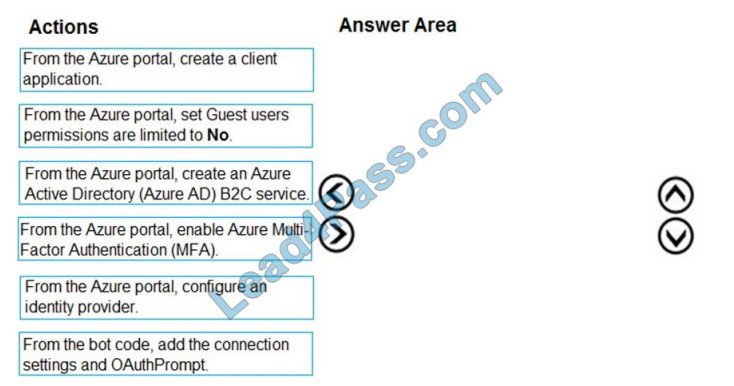
Correct Answer:
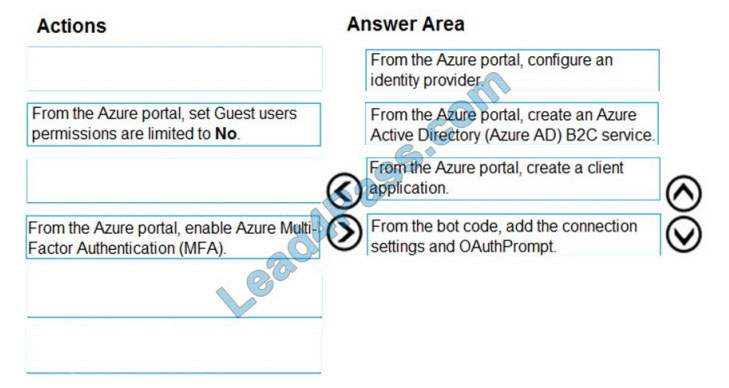
Step 1: From the Azure portal, configure an identity provider.
The Azure Bot Service and the v4 SDK include new bot authentication capabilities, providing features to make it easier
to develop a bot that authenticates users to various identity providers, such as Azure AD (Azure Active Directory),
GitHub,
Uber, and so on.
Step 2: From the Azure portal, create an Azure Active Directory (Azure AD) B2C service.
Azure Active Directory B2C provides business-to-customer identity as a service. Your customers use their preferred
social, enterprise, or local account identities to get single sign-on access to your applications and APIs.
Step 3: From the Azure portal, create a client application
You can enable communication between your bot and your own client application by using the Direct Line API.
Step 4: From the bot code, add the connection settings and OAuthPrompt
Use an OAuth prompt to sign the user in and get a token.
Azure AD B2C uses standards-based authentication protocols including OpenID Connect, OAuth 2.0, and SAML.
References:
https://docs.microsoft.com/en-us/azure/bot-service/bot-builder-authentication?view=azure-bot-service-4.0
QUESTION 3
You are developing an application that will perform optical character recognition of photos of medical logbooks.
You need to recommend a solution to validate the data against a validated set of records.
Which service should you include in the recommendation?
A. Azure Data Catalog
B. Text Analytics
C. Bing Autosuggest
D. Master Data Services (MDS) in Microsoft SQL Server
Correct Answer: D
References: https://docs.microsoft.com/en-us/sql/master-data-services/validation-master-data-services?view=sqlserver-2017
QUESTION 4
HOTSPOT
You have an app that uses the Language Understanding (LUIS) API as shown in the following exhibit.
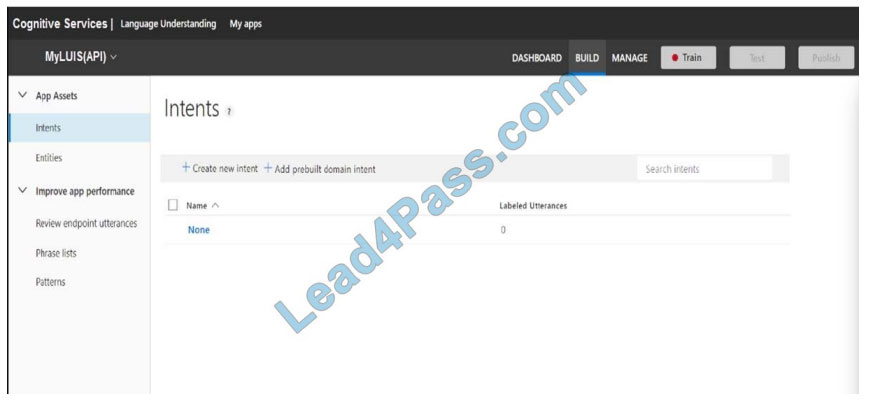
Use the drop-down menus to select the answer choice that completes each statement based on the information
presented in the graphic.
NOTE: Each correct selection is worth one point.
Hot Area:
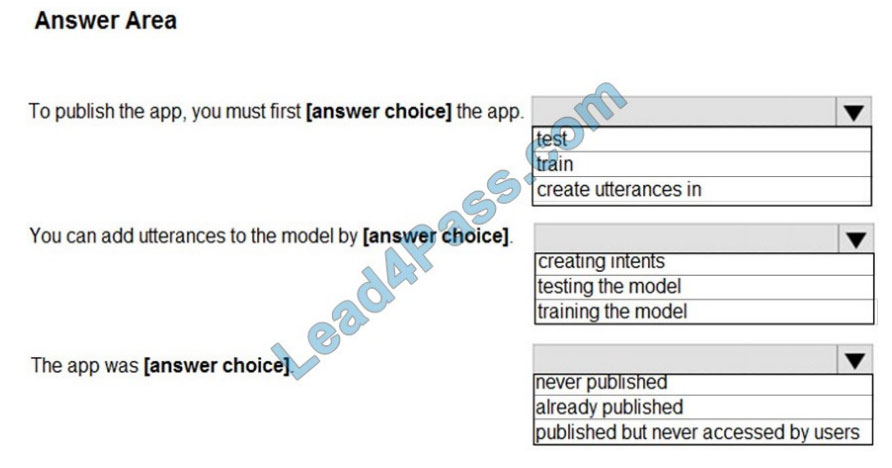
Correct Answer:
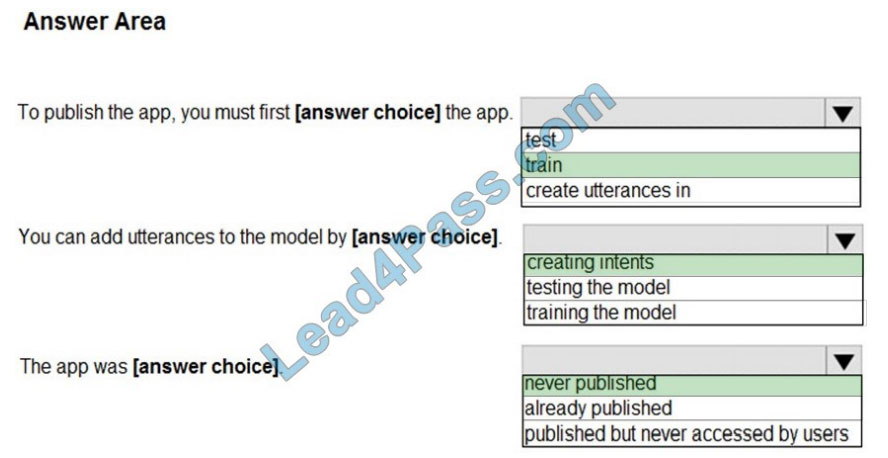
Box 1: train
Utterances are input from the user that your app needs to interpret. To train LUIS to extract intents and entities from
them, it\\’s important to capture a variety of different example utterances for each intent. Active learning, or the process of continuing to train on new utterances, is essential to machine-learned intelligence that LUIS provides.
Box 2: creating intents
Each intent needs to have example utterances, at least 15. If you have an intent that does not have any example
utterances, you will not be able to train LUIS. If you have an intent with one or very few example utterances, LUIS will
not accurately predict the intent.
Box 3: never published
In each iteration of the model, do not add a large quantity of utterances. Add utterances in quantities of 15. Train,
publish, and test again.
References:
https://docs.microsoft.com/en-us/azure/cognitive-services/luis/luis-concept-utteran3ce
QUESTION 5
DRAG DROP
You are designing an AI solution that will analyze media data. The data will be stored in Azure Blob storage.
You need to ensure that the storage account is encrypted by using a key generated by the hardware security module
(HSM) of your company.
Which three actions should you perform in sequence? To answer, move the appropriate actions from the list of actions
to the answer area and arrange them in the correct order.
Select and Place:
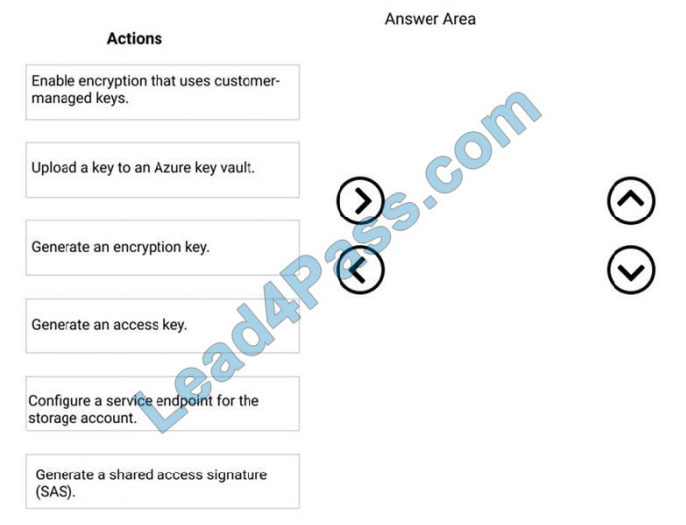
Correct Answer:
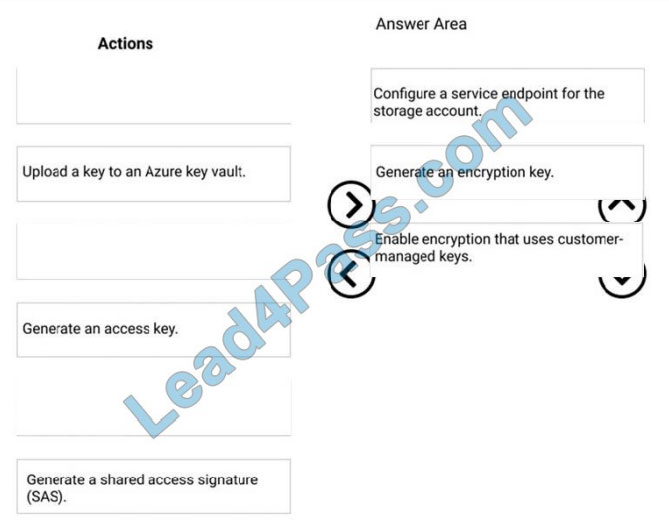
References: https://docs.microsoft.com/en-us/azure/storage/common/storage-encryption-keys-portal
https://docs.microsoft.com/en-us/azure/key-vault/key-vault-hsm-protected-keys
QUESTION 6
Your company recently deployed several hardware devices that contain sensors.
The sensors generate new data on an hourly basis. The data generated is stored on-premises and retained for several
years.
During the past two months, the sensors generated 300 GB of data.
You plan to move the data to Azure and then perform advanced analytics on the data.
You need to recommend an Azure storage solution for the data.
Which storage solution should you recommend?
A. Azure Queue storage
B. Azure Cosmos DB
C. Azure Blob storage
D. Azure SQL Database
Correct Answer: C
References: https://docs.microsoft.com/en-us/azure/architecture/data-guide/technology-choices/data-storage
QUESTION 7
Your company plans to develop a mobile app to provide meeting transcripts by using speech-to-text. Audio from the
meetings will be streamed to provide real-time transcription.
You need to recommend which task each meeting participant must perform to ensure that the transcripts of the
meetings can identify all participants.
Which task should you recommend?
A. Record the meeting as an MP4.
B. Create a voice signature.
C. Sign up for Azure Speech Services.
D. Sign up as a guest in Azure Active Directory (Azure AD)
Correct Answer: B
The first step is to create voice signatures for the conversation participants. Creating voice signatures is required for
efficient speaker identification.
Note: In addition to the standard baseline model used by the Speech Services, you can customize models to your needs with available data, to overcome speech recognition barriers such as speaking style, vocabulary and background noise.
References:
https://docs.microsoft.com/bs-latn-ba/azure/cognitive-services/speech-service/how-to-use-conversation-transcriptionservice
QUESTION 8
You plan to design an application that will use data from Azure Data Lake and perform sentiment analysis by using
Azure Machine Learning algorithms.
The developers of the application use a mix of Windows- and Linux-based environments. The developers contribute to
shared GitHub repositories.
You need all the developers to use the same tool to develop the application.
What is the best tool to use? More than one answer choice may achieve the goal.
A. Microsoft Visual Studio Code
B. Azure Notebooks
C. Azure Machine Learning Studio
D. Microsoft Visual Studio
Correct Answer: C
References: https://github.com/MicrosoftDocs/azure-docs/blob/master/articles/machine-learning/studio/algorithmchoice.md
QUESTION 9
Your company is building custom models that integrate into microservices architecture on Azure Kubernetes Services
(AKS).
The model is built by using Python and published to AKS.
You need to update the model and enable Azure Application Insights for the model.
What should you use?
A. the Azure CLI
B. MLNET Model Builder
C. the Azure Machine Learning SDK
D. the Azure portal
Correct Answer: C
You can set up Azure Application Insights for Azure Machine Learning. Application Insights gives you the opportunity to
monitor:
1.
Request rates, response times, and failure rates.
2.
Dependency rates, response times, and failure rates.
3.
Exceptions.
Requirements include an Azure Machine Learning workspace, a local directory that contains your scripts, and the Azure
Machine Learning SDK for Python installed.
References:
https://docs.microsoft.com/bs-latn-ba/azure/machine-learning/service/how-to-enable-app-insights
QUESTION 10
Note: This question is part of a series of questions that present the same scenario. Each question in the series contains
a unique solution that might meet the stated goals. Some question sets might have more than one correct solution,
while others might not have a correct solution.
After you answer a question, you will NOT be able to return to it. As a result, these questions will not appear in the
review screen.
You have an Azure SQL database, an Azure Data Lake Storage Gen 2 account, and an API developed by using Azure
Machine Learning Studio.
You need to ingest data once daily from the database, score each row by using the API, and write the data to the
storage account.
Solution: You create a scheduled Jupyter Notebook in Azure Databricks.
Does this meet the goal?
A. Yes
B. No
Correct Answer: B
We need to schedule the job in Azure Data Factory.
QUESTION 11
You have an Azure SQL database an Azure Data Lake Storage Gen 2 account, and an APi developed by using Azure
Machine Learning Studio.
You need to ingest data once daily from the database. score each row by using me API, and write the data to the
storage account
Solution: You create an Azure Data Factory pipeline that contains the Machine Learning Batch Execution activity. Does
this mew the goal?
A. Yes
B. NO
Correct Answer: A
QUESTION 12
Your company has a data team of Transact-SQL experts.
You plan to ingest data from multiple sources into Azure Event Hubs.
You need to recommend which technology the data team should use to move and query data from Event Hubs to Azure Storage. The solution must leverage the data team\\’s existing skills.
What is the best recommendation to achieve the goal? More than one answer choice may achieve the goal.
A. Azure Notification Hubs
B. Azure Event Grid
C. Apache Kafka streams
D. Azure Stream Analytics
Correct Answer: B
Event Hubs Capture is the easiest way to automatically deliver streamed data in Event Hubs to an Azure Blob storage
or Azure Data Lake store. You can subsequently process and deliver the data to any other storage destinations of your
choice, such as SQL Data Warehouse or Cosmos DB.
You to capture data from your event hub into a SQL data warehouse by using an Azure function triggered by an event
grid. Example:

First, you create an event hub with the Capture feature enabled and set an Azure blob storage as the destination. Data
generated by WindTurbineGenerator is streamed into the event hub and is automatically captured into Azure Storage
as Avro files.
Next, you create an Azure Event Grid subscription with the Event Hubs namespace as its source and the Azure
Function endpoint as its destination. Whenever a new Avro file is delivered to the Azure Storage blob by the Event Hubs Capture
feature, Event Grid notifies the Azure Function with the blob URI. The Function then migrates data from the blob to a
SQL data warehouse.
References:
https://docs.microsoft.com/en-us/azure/event-hubs/store-captured-data-data-warehouse
QUESTION 13
You need to create a prototype of a bot to demonstrate a user performing a task. The demonstration will use the Bot
Framework Emulator. Which botbuilder CLI tool should you use to create the prototype?
A. Chatdown
B. QnAMaker
C. Dispatch
D. LuDown
Correct Answer: A
Use Chatdown to produce prototype mock conversations in markdown and convert the markdown to transcripts you can load and view in the new V4 Bot Framework Emulator. Incorrect Answers:
B: QnA Maker is a cloud-based API service that lets you create a conversational question-and-answer layer over your
existing data. Use it to build a knowledge base by extracting questions and answers from your semi-structured content,
including FAQs, manuals, and documents. Answer users\\’ questions with the best answers from the QnAs in your
knowledge base–automatically. Your knowledge base gets smarter, too, as it continually learns from user behavior.
C: Dispatch lets you build language models that allow you to dispatch between disparate components (such as QnA,
LUIS and custom code).
D: LuDown build LUIS language understanding models using markdown files
References: https://github.com/microsoft/botframework/blob/master/README.md
Continue to follow to get more free updates…
New 2021 Azure AI-100 exam questions from leads4pass AI-100 Dumps! Welcome to download the newest leads4pass AI-100 VCE and PDF dumps: https://www.leads4pass.com/ai-100.html (181 Q&As)
P.S. Free 2021 Azure AI-100 Dumps are available on Google Drive shared by leads4pass: https://drive.google.com/file/d/1fT67LjZymijCvGqGlML0X7jRhJ7u3osb/

